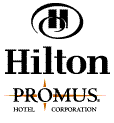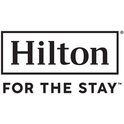CNBC- Squawk Box Interview With Promus Hotel Chairman And Ceo Norman Blake, Jr. And Hilton Hotels President And Ceo Stephen Bollenbach - September 7, 1999

SUMMARY: Blake believes the merger gives the combined company a significant revenue enhancement opportunity. Bollenbach says the merger fits exactly within Hilton Hotels' strategy.
Mark: Merger fever gripping not only the media business where CBS and Viacom are getting together, but the hotel business. Hilton and Promus have finalized a deal that we've been first speculating about and then reporting about. It's four billion dollars will be in cash, stock and debt. The new company will have about 1,700 hotels and expects savings of 55 million dollars in its first year. Stephen Bollenbach is President and CEO at Hilton Hotels. And Norman Blake is Chairman and CEO of Promus Hotel. Both of them are with us today. Good morning, gentlemen. Thank you very much for being with us.
Good morning, Mark.
Mark: I'll start with Mr. Bollenbach, since I've talked to him before. $55 million in savings in the first year implies more to come; is that fair?
Yes. We think that in a full year, in the following year, we should be able to get those savings and also the new revenues, up to about $90 million a year.
Mark: Okay. That's pretty healthy. Mr. Blake, what does this combination do that you couldn't do yourself?
It gives us a brand with the Hilton name, particularly in the top end of the segment and will provide significant revenue enhancement opportunities relative to their national sales as well as their frequency program. And frankly, also some significant cost synergies that Steve has already mentioned.
Mark: Okay. So, the plan is to combine and make the best of what you've got or combine and expand further or go into other price points? I mean, give us some hints here about the future.
Well, I think that the plan is to put the two together and make one plus one equal three. You know, we've got different price segments in our brands. And by cross selling across those price segments, we'll be able to add enormous revenues. By delivering our Hilton honors, which is our frequency program, we'll be able to add a lot of value to the Promus Hotels. So, that's really where the value comes from.
Mark: Mace?
Maceo Sloan: I would assume, this is Maceo Sloan. I would assume you'll have the reservation for Hilton handled, the reservations for the whole chain now?
Yeah. We'll combine the reservation system, and it'll be taking the both, the best from both of the two systems.
Mark: I believe either Joe or David wants in. I don't remember who.
David: I'll ask a question, Mark, this is David Faber. Mr. Bollenbach, some of your shareholders, in speaking to them last week when this deal was subject to speculation, said Hilton has always articulated its vision to us as being an owner of 10 very large properties in key markets where there was an inability to add capacity. This deal would seem to go counter to that. Could you sort of explain what you're telling them now about the new strategy?
Sure, David. We've always said we have a several part strategy, which included growing the brand, owning hotels in markets where it's hard to penetrate, and making use of the capital markets. This hits very solidly in the good use of the capital markets, and in expanding the brands. What it'll do for us is it'll take the portion of our revenues and profits that come from fee income, management and franchise fees, from about 13% to 30%. And that's very important in the markets today. But this fits exactly within the strategies that we've been talking about for the last four years.
David: Mr. Blake, on behalf of the combined company as well, is this deal going to be additive to the combination right off the bat or is there going to be some dilution in the first year or two?
I think that Steve is more appropriate to respond to that, but my understanding is that it would be dilutive in the first year and neutral relative to the consensus analyst estimates in the following year.
David: Mr. Bollenbach, let me go to you then, since it is more appropriate. In terms of the growth rate of the combined company, do you anticipate that that will be enhanced as a result of this merger or are you guiding analysts towards the same growth rate you have been?
David, the growth rate will go up significantly. We'll be able to grow at a rate greater than 20% a year. And in terms of you asked about the dilution, it'll be modestly dilutive the first year. By modest, I mean, it's maybe six percent dilutive to earnings, but we'll get that turned around by the second year. And then we have tremendous ability to grow.
Maceo Sloan: When you look at this combination, this is Maceo Sloan again. Who sits in what position in the new company? Since I noticed in the press release you put out, it doesn't have who is going to be in what position and who is going to have responsibility for what. Can you give us a feel for how management responsibility will be divided?
Yes. I will continue as Chief Executive. Norm has agreed to work with me over the next few months in a transitional role as we integrate the organizations. We'll follow the practice that we've followed in a number of mergers that we've been involved in, in the past. And that is picking the best people from each organization for jobs that are redundant without regard to which organization they came from.
Mark: Well, gentlemen, we wish you the best of luck. We're out of time here, but thank you very much for joining us and best of luck with the new venture.
Thanks, Mark.
Thank you.
Mark: Appreciate it. Stephen Bollenbach, of course, is CEO at Hilton Hotels and Norman Blake, Chairman and CEO at Promus Hotels.
Source: CNBC Squawk Box
